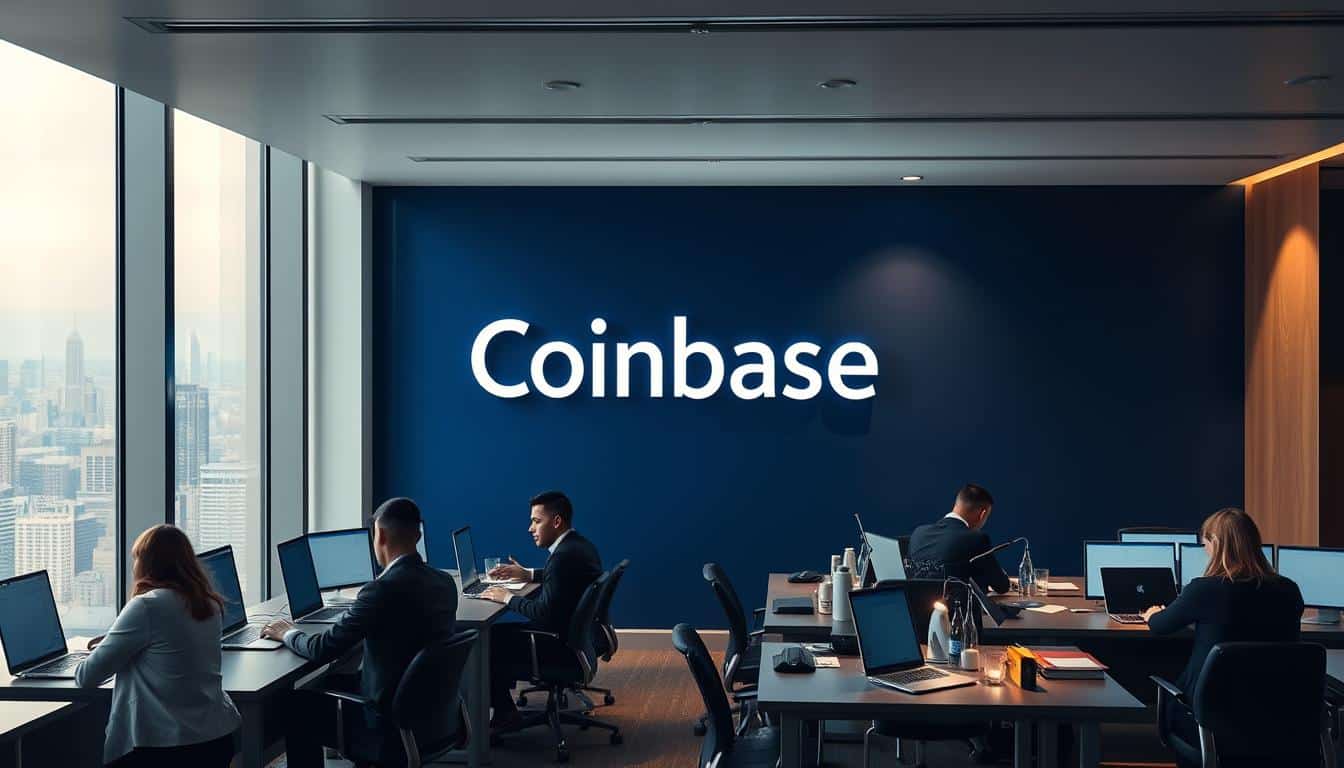A single regulatory proposal can change hiring in an entire industry. When the U.S. Commodity Futures Trading Commission (CFTC) considered using stablecoins like USDC as collateral, interest in crypto companies grew. Suddenly, there was a high demand for people skilled in compliance, legal, and product risk management.
I’ve closely observed these changes over the years. As an expert in fintech and blockchain employment trends, I understand the appeal of Coinbase jobs. They offer exciting blockchain projects, quick development times, and deep insights into regulated markets. This makes jobs at Coinbase feel both important and fulfilling.
In this article, I will help job seekers interested in technology explore digital asset opportunities at Coinbase. Expect to learn about employment growth charts, salary ranges, how to stay at a job longer, resume tips, and how to prepare for interviews in fintech. You’ll get practical advice, learn about regulations, and discover tips for landing a job in blockchain and cryptocurrency.
Key Takeaways
- Regulatory moves, like the CFTC stablecoin proposal, can drive hiring at Coinbase and across the crypto sector.
- Coinbase jobs span engineering, product, compliance, and marketing — offering diverse fintech positions.
- Understanding blockchain employment trends helps you target roles where demand is rising.
- Later sections provide data-driven salary ranges and retention insights for practical decision-making.
- Tools for resumes, networking, and interview prep will be recommended to boost your candidacy for cryptocurrency careers.
Overview of Coinbase as an Employer
I have seen Coinbase grow from a startup to a public entity. Product launches and regulatory answers show why jobs at Coinbase and cryptocurrency careers are sought after. Coinbase aims to create an open financial system with digital assets. This goal guides their efforts daily.
Company Mission and Values
Leaders focus on making finance accessible and ensuring security is top-notch. Their actions and legal stances line up with their products and policies. Leaders like Paul Grewal have pushed for discussions on tokenized assets that fit with CFTC regulations.
This consistency is key for those eyeing fintech and cryptocurrency paths. You enter a place where strategy revolves around market systems, using stablecoins, and reaching institutions.
Work Culture and Environment
The atmosphere is somewhat casual but gives lots of freedom. Engineers quickly test new ideas, especially on blockchain and DLT tech. Teams also stay in tune with legal rules, adapting fast to changes from bodies like CFTC and SEC.
Teamwork spans different groups. Projects blend product development, engineering, and policy issues. This setup brings challenges but rewards those who enjoy tackling regulatory and technical problems.
Employee Testimonials
From online forums and official comments, a clear pattern emerges. Workers value engaging with regulations, playing active roles in initiatives like those from the CFTC. Discussions often involve peers like Circle and Ripple, which also informs the company’s internal directions.
Staff praise the joint efforts of product and legal teams. They talk about work that merges tech skills with policy understanding. For those seeking roles in fintech, such an environment promises quick learning and meaningful contributions.
| Aspect | What Employees Report | Why It Matters for Applicants |
|---|---|---|
| Mission alignment | Frequent references to open finance goals and regulatory engagement | Clarifies expectations for policy-aware product work in coinbase jobs |
| Team structure | Autonomous squads with cross-functional ties to compliance | Good fit for candidates who like responsibility and rapid iteration |
| Technical focus | Work on blockchain stacks, tokenized collateral, and market infrastructure | Appeals to engineers seeking hands-on DLT experience for cryptocurrency careers |
| Regulatory interaction | Active engagement with CFTC initiatives and industry partners | Prepares employees for roles that blend law, policy, and engineering |
| Culture vibe | Semi-casual, high-expectation, mission-driven | Attracts people chasing fintech positions with impact and responsibility |
Types of Job Positions Available at Coinbase
I’ve been watching Coinbase grow. They’re now hiring for many different jobs because crypto is getting popular. They have jobs from engineering to sales. So, if you’re good with computers, understand laws, or like working with clients, there’s a job for you at Coinbase.
I’ll explain the main types of jobs at Coinbase and what you need for them. This can help you see if your skills fit jobs in blockchain or fintech.
Tech and Engineering Roles
Engineers at Coinbase work on important tech. They handle trading, keeping assets safe, and dealing with transactions. They hire people like backend engineers and those who know about blockchain. They are also looking for security experts. These tech jobs are really focused on trading fast and keeping things safe.
If you know about how blockchains communicate and can handle lots of transactions quickly, you’re in a good spot. Teams work with the legal department to make sure everything’s okay by law. This is because the rules around crypto are still being figured out.
Marketing and Sales Careers
The marketing team at Coinbase tries to get more people to use their service. There are jobs like being in charge of marketing a product to helping the company grow. Those who work in sales talk to big investors like hedge funds. They try to get them interested in what Coinbase offers.
As digital money becomes more popular, people who can talk about the rules clearly will be needed. If you understand tech and can explain it to big money investors, you could fit in well here.
Compliance and Legal Job Opportunities
Coinbase hires people for legal and rules-watching jobs. They need experts who understand how to value crypto, how to safely keep it, and who can talk to government agencies. Jobs in this area are super important as the laws around crypto are always changing.
Right now, making sure crypto follows the rules is a big deal. Lawyers and rules experts work with the tech folks to make sure Coinbase’s products follow new laws. The head people at Coinbase have said following the law, especially around digital money, is key.
| Job Family | Common Roles | Key Skills | Why It Matters |
|---|---|---|---|
| Engineering | Backend Engineer, Protocol Engineer, Smart-Contract Auditor, DevOps, Security | DLT, low-latency systems, Rust/Go, cryptography, CI/CD | Builds secure settlement and trading platforms for scale |
| Marketing & Sales | Product Marketing, Growth, Institutional Sales | Go-to-market strategy, data analysis, client relationship management | Drives adoption and institutional flows as tokenization grows |
| Compliance & Legal | Compliance Analyst, AML Specialist, Legal Counsel, Custody Lawyer | Regulatory interpretation, AML systems, custody law, policy coordination | Ensures products meet regulatory tests and support institutional trust |
Key Statistics on Coinbase Employment Trends
I watch hiring trends like a scout looking at the sky. The market, rules, and new products change quickly. These things shape jobs at Coinbase and the roles available in the next 12-24 months.
I’ll share key numbers here: hiring in the industry, Coinbase’s pay, and how stability affects staying on the job. Short points. Clear figures. Useful lessons.
Employment Growth in the Crypto Sector
Actions by regulators like the CFTC have real effects on the market. A major statement from the CFTC once boosted Coinbase stock by almost 17%. This hints that big investors are getting more involved. Such market signals often lead to more hiring in areas like engineering, risk, and compliance.
The size of the stablecoin market is also important to watch. With a global worth of $254 billion, the need grows for teams that can handle tokenized assets. These big trends suggest good news for jobs in special areas of crypto.
Average Salary Ranges at Coinbase
What you earn depends on your job and where you are, but Coinbase pays well, especially in big tech cities in the U.S. Jobs in senior engineering, products, and legal stuff related to tokenization and derivatives get paid more. This means a higher average salary at Coinbase for those with experience in core tech and rules-following roles.
People in mid-range tech jobs get salaries, shares, and bonuses that match the market. The pay for top jobs in compliance and engineering reflects how rare deep skills in these areas are.
Employee Retention Rates
How long people stay in fintech jobs changes with the market. Clear rules from regulators can make people stick around longer by reducing uncertainty. When the government asks for opinions or starts test projects, it leads to long-term work that keeps people engaged.
On the other hand, when the market jumps around a lot, more people leave their jobs. For those looking at jobs at Coinbase, knowing the patterns of how long people stay is as important as the pay offers. Teams on long-term projects usually stay together longer than those on quick tasks.
| Indicator | Current Signal | Implication for Hiring |
|---|---|---|
| CFTC announcement effect | ~+17% Coinbase share reaction | Boost to hiring in derivatives engineering and compliance |
| Stablecoin market cap | ~$254 billion global | Greater demand for tokenization, product, and security teams |
| Average salary trends | Higher in senior engineering, product, legal roles | Competitive offers for specialized talent in U.S. fintech hubs |
| Retention drivers | Regulatory clarity and multi-year pilots | Improved employee retention fintech where projects are stable |
These figures don’t tell us exactly which jobs will open. But they help us understand the demand for jobs at Coinbase and show how job growth, salaries, and staying on the job interact as the market gets more mature.
Tools for Job Seekers Interested in Coinbase
I’ll talk about the toolkit I used for getting a job at crypto firms like Coinbase. It includes how to build your resume, make connections, and nail your interview. These tools go with what the hiring teams want: knowing about custody, valuing assets, AML controls, and blockchain tech.
Resume Building Resources
Start with a resume that stands out to Coinbase in 10 seconds. Show off your achievements with numbers: how much you settled onchain, the custody frameworks you’ve built, or AML controls you set up. For developers, show your blockchain projects on GitHub rather than writing too much.
If you’re into legal or compliance, detail your casework and compliance programs. Highlight your expertise in areas like valuation, custody, and AML. Link your work to things like tokenized collateral and blockchain’s potential for making systems work together better.
Networking Platforms
On LinkedIn, introduce yourself to others and post updates on regulations in a short, engaging way. Go to meetups and panels with speakers from companies like Circle and Ripple. Using insights from the Crypto CEO Forum can help you spark conversations at these gatherings.
Don’t overlook the chance to network during public comment periods on regulations. The CFTC looks for feedback on their ideas. Joining in or speaking on related panels gets you noticed by regulators and potential bosses. This makes your networking in crypto more effective by focusing on timely issues.
Interview Preparation Tools
Make a list that includes both tech and rules you should know. Practice explaining blockchain tech, how to manage collateral, and talk about custody and asset valuation. Add coding tests for tech roles and case studies for legal roles to your practice.
Try out mock interviews. Platforms that offer practice for coding and regulatory questions are great. Be ready to talk about recent rules from the CFTC and SEC, and mention examples from companies like Circle or Ripple. Specific examples make your interview answers stand out and show you’re right for the job.
How to Apply for Jobs at Coinbase
I’ve been through the hiring steps at Coinbase a few times. I’ll tell you what worked for me. The steps are straightforward but need careful planning. You should start by making a profile. Then, gather evidence specific to the role. Lastly, customize your approach to fit Coinbase’s rules and product landscape.
Let’s break down the process so you can easily follow it.
Online Application Process
Go to Coinbase Careers and make your profile. Fill in all the basic information. Make sure your summary is brief and fits the job and team you’re aiming for. If your application looks like everyone else’s, it probably won’t get noticed.
For the roles you’re interested in, add a resume and portfolio made just for that position. Engineers, for instance, should share their GitHub and any live projects they’ve worked on. If you’re going for a compliance role, include writings on things like custody, how things are valued, or anti-money laundering rules. If the job has to do with token assets, talk about your experience with DLT settlement or using USDC.
If you’re applying for compliance or a role in derivatives, they’ll want to know about your regulatory experience. Say you’ve worked on things like custody issues or how stablecoins are backed. Talk about what you did, what you achieved, and how you stayed updated on policies, like new rules from the CFTC.
Tips for Submitting Your Application
Be exact in what you mention. Share links to your GitHub, blockchain projects, or compliance reports you’ve written. Recruiters prefer real examples over just talking about what you can do. A simple README or a demo video can make a big difference.
Talk about regulatory changes you know about. For example, mention discussions on collateral for stablecoins or the GENIUS Act, if they’re relevant. If you’ve ever given feedback during a public comment period, mention that too. These details can really help your application stand out for a fintech role.
When writing your resume, use industry keywords in a natural way. Mention your direct experience with tokenized collateral, anti-money laundering processes, or handling USDC. A cover letter that clearly shows how your skills can lower product or regulatory risks will help you get an interview at Coinbase.
Common Interview Questions
Engineers should expect to solve coding problems. You’ll be tested on algorithms, how you design systems, and integrating blockchain. Get ready for pair programming and small projects.
During compliance interviews, be prepared for questions about detecting money laundering, what to do if custody fails, and how to respond to new policies. You might have to write short memos that refer to rule changes or industry news. Study up on recent SEC and CFTC updates and be ready to talk about them.
For product roles, expect questions on using tokenized collateral and reducing risks. They’ll also ask how you handle unclear rules and if you’ve worked with legal teams before. Bring examples that show you can navigate these challenges.
Use public statements and the time you can comment on rules as material to prepare. If you’ve ever read or submitted a comment, mentioning it can help you stand out in your Coinbase interview.
| Step | What to Include | Why It Helps |
|---|---|---|
| Create Coinbase Careers Profile | Concise headline, role targets, core skills | Ensures recruiters match you to the right openings |
| Tailored Resume & Portfolio | GitHub links, onchain demos, compliance memos | Provides concrete evidence of capability |
| Regulatory Work Samples | Custody analysis, AML case studies, policy comments | Signals domain depth for fintech positions application |
| Cover Note | Brief problem-solution statement tied to role | Helps recruiters see immediate fit |
| Interview Prep | Practice coding tasks, scenario memos, product cases | Readies you for technical and behavioral rounds |
Predictive Analysis: The Future of Coinbase Jobs
Looking at regulatory proposals and product plans, a trend is clear. More tools for institutions mean more jobs at Coinbase. The discussion on tokenized collateral and onchain settlement shows growing hiring needs, not just in typical product teams. This is key for anyone eyeing future jobs at Coinbase and career paths in crypto.
Market structure changes predict job growth in blockchain. If bodies like the CFTC and SEC set clearer rules for tokenized assets, teams focusing on custody and compliance will grow. The need for engineers and operations staff will rise with institutional derivatives tied to tokenized collateral.
Upcoming roles at Coinbase will likely include tokenomics engineers and onchain settlement architects. We’ll also see the need for collateral risk managers. Sales teams and regulatory liaison roles focusing on derivatives will emerge. Signals from companies like Circle and Ripple show a trend Coinbase must follow to keep up.
Future jobs will need a mix of tech knowledge and policy understanding. Skills in distributed ledger technology, smart-contract security, and custody engineering are essential. Expertise in AML/CTF and knowledge of CFTC, SEC, and FinCEN regulations will be valuable. Experience in traditional derivatives will also help candidates stand out.
Soft skills are important too. Tasks will include turning legal requirements into technical specifications and working with different agencies. The ability to mix technical skills with teamwork defines what will be needed in blockchain jobs.
To get ready, dive into custody systems and smart-contract security. Keep an eye on job openings at Coinbase through reliable sources. Check out explore opportunities at Coinbase to match your skills with what’s coming in both Coinbase and the broader market.
Frequently Asked Questions (FAQs) About Coinbase Jobs
I often hear cryptocurrency career questions from friends and peers. Here, you’ll find short answers about hiring, pay, and working from afar at Coinbase. This info is for when you’re ready to apply.
What Qualifications Do I Need?
Looking at technical jobs, a computer science degree or similar experience is key. Having a solid GitHub and work on blockchain projects is crucial. It’s your skills, not the school you went to, that Coinbase values most.
For compliance and legal roles, knowledge in AML, custody law, or work in securities is needed. Being up-to-date with CFTC and SEC rules is a huge advantage. Make sure your resume shows your relevant work clearly.
How Competitive are Coinbase Salaries?
Coinbase salary offers match the high demand in fintech, especially for engineers and legal roles. They’re on par with top crypto firms and traditional tech companies.
As stablecoins become more accepted, there’s more need for experts in custody and compliance. This trend increases pay for those who know both engineering and policy.
Does Coinbase Offer Remote Work?
Coinbase is open to flexible working arrangements. But, it really depends on the job and if it meets certain legal or security needs. Jobs that deal with U.S. regulators or need a lot of teamwork might require being in the U.S. or going into the office more.
If working from home is what you’re after, stress your experience in remote teamwork and security in your app. Coinbase looks for those who can stick to high standards, even when not in the office.
These FAQs on Coinbase jobs, from needed qualifications to pay and remote work options, cover the big questions hiring managers ask. Remember to keep your interview answers focused and backed by facts.
The Importance of Diversity at Coinbase
I’ve seen Coinbase change its hiring as it faces new rules and grows worldwide. Diverse teams in product, legal, and compliance mean better policy understanding and stronger products. This is key when dealing with rules from agencies like the CFTC and SEC.
Diversity Initiatives and Programs
Coinbase has set diversity plans for hiring in law, compliance, international work, and engineering. These plans include reaching out specially, working with groups, and mentoring inside the company. This brings faster answers to regulations and smarter product launches.
Benefits of a Diverse Workforce
A team with different backgrounds is better at evaluating risks and meeting global users’ needs. They help the company quickly answer public and regulator questions. For instance, diverse skills lead to safer ways to handle tokens and stablecoin storage.
Statistics on Diversity Hiring
The trend is to spend more on diverse hiring, though companies differ. Stats suggest hiring more for roles needing compliance knowledge and global insight. This shift makes companies more adaptable to regulation, tech, and business needs.
This table shows how different hiring areas help with compliance and product strength.
| Focus Area | Primary Roles | Impact on Compliance |
|---|---|---|
| Legal & Regulatory | Regulatory Counsel, Policy Analysts | Improves interpretation of CFTC/SEC guidance |
| Technical | Engineers, Security Architects | Builds secure custody and tokenization systems |
| Operations & Compliance | AML Officers, Compliance Managers | Strengthens transaction monitoring and controls |
| Global & Market | Localization, Regional Compliance | Aligns products with local regulatory regimes |
Looking at Coinbase’s job diversity and hiring stats shows how teams grow. As rules get stricter, having a diverse team is key for exchanges to stay safe and competitive.
Benefits and Perks of Working at Coinbase
I’ve seen how great benefits keep fintech teams on point during long projects. Coinbase has a mix of top U.S. benefits and special programs for long-term work.
Health and Wellness
Coinbase has essential health benefits like medical, dental, and vision for full-timers. These help with big projects, like token pilots that take years.
They offer wellness programs too, covering mental health and preventive care. This helps prevent burnout for teams dealing with big-deal regulations.
Employee Development
Learning on the job is key for crypto pros. Coinbase offers training in custody, AML, and blockchain tech.
Working on cross-team projects and with regulators speeds up skill building. Employees working on derivatives and tokens get valuable, hands-on experience.
Work-Life Balance
There are flexible schedules and remote work for many jobs. This balance is crucial for deep tech work and personal life harmony.
Some roles need on-call shifts or to be in a certain place because of markets or regulations. Coinbase tries to adapt staffing to fit project needs and keep teams happy.
| Benefit Area | What You Get | Why It Matters |
|---|---|---|
| Health Coverage | Medical, dental, vision, mental health support | Supports sustained work on multi-year regulatory projects |
| Professional Growth | Internal training, regulatory engagement, cross-team projects | Accelerates employee development crypto skills for high-value roles |
| Work Model | Flexible schedules, remote options, some on-call roles | Balances focus work with personal time while covering critical operations |
| Retention Perks | Targeted bonuses, project-focused incentives, learning stipends | Aligns Coinbase perks with long-term infrastructure goals |
Conclusion: The Path Forward in Coinbase Employment
I’ve seen how hiring at Coinbase changes with policy and market shifts. I’m sharing what I know. The future of working at Coinbase is not just one path. It’s like a web of technical, regulatory, and creative routes. Choose a path that suits you and plan your steps carefully.
Making the Most of Opportunities
Learn about blockchain technology firsthand. Help with open-source projects. Make prototypes for custody or collateral to show in demos. Keep up with government proposals and company filings. This knowledge is good for job interviews. I recommend getting involved in industry events. It helps you understand details and stand out to employers.
Staying Updated on Job Openings
Keep an eye on Coinbase Careers and LinkedIn. Don’t forget about specialty job boards for crypto roles. Follow changes in government regulations. These changes often mean Coinbase is hiring. I check these sources every week. It helps me apply at the best times.
Building a Career in the Crypto Industry
Learn both coding and rules about crypto. Jobs in custody engineering, building derivative tools, and managing products will be important. This is because rules about stablecoins and collateral are changing. Know platforms like Ethereum and Solana. Understand how custody works. Watch for new rules about stablecoins and derivatives.
Here’s a guide to what you should focus on. It shows skills you need, jobs you might get, and upcoming rules.
| Focus Area | Core Skills | Likely Roles | Regulatory Signals to Watch |
|---|---|---|---|
| Custody & Collateral | Key management, secure enclaves, multi-sig, cryptography | Custody Engineer, Security Architect, Crypto Ops | CFTC collateral proposals, custody guidance from SEC |
| Derivatives Infrastructure | Matching engines, risk models, margin mechanics | Derivatives Engineer, Quant Dev, Risk Product Manager | Stablecoin collateral rules, exchange licensing changes |
| Regulatory Product Management | Policy analysis, product design, stakeholder engagement | Regulatory PM, Compliance Lead, Policy Counsel | CFTC/SEC rulemaking, public comment periods |
| Open-source & Dev Relations | SDKs, documentation, community engagement | Developer Advocate, Protocol Engineer, Integrations Lead | Standards work, industry consortium announcements |
To really make it in crypto, focus on one tech area and one regulatory area. This combo prepares you to quickly seize opportunities. It makes you well-rounded for the job market.
If you’re aiming for a future in blockchain jobs, stay eager and involved. Dive into proposals, start small projects, and interact with the community. This is what makes you stand out to employers at Coinbase and elsewhere in the field.
Additional Resources for Job Seekers
I have some go-to places when looking for Coinbase job resources. Start by checking Coinbase Careers and LinkedIn for the latest job postings. If you’re looking for special roles, CryptoJobsList and fintech boards are great. They list jobs in areas like derivatives and compliance, which are important as the field grows.
To boost your skills, I recommend platforms like Coursera, Udemy, MIT OpenCourseWare, and ConsenSys Academy. These sites are helpful for learning about smart contract development and other technical skills. People interested in legal roles should focus on learning about regulations and compliance to be ready for job interviews.
When it comes to networking, I find conferences and local meetups very helpful. Attending events like the CFTC’s Crypto CEO Forum gives insight and connections. Engaging in these events can make you stand out to employers.
Don’t forget about practical tools and preparations. Keep your GitHub updated, practice your interview skills, and read up on regulations. Use resources like the CFTC’s public comments and SEC materials to talk more effectively about technical subjects. Combine job boards, learning platforms, and networking for the best job search strategy.








